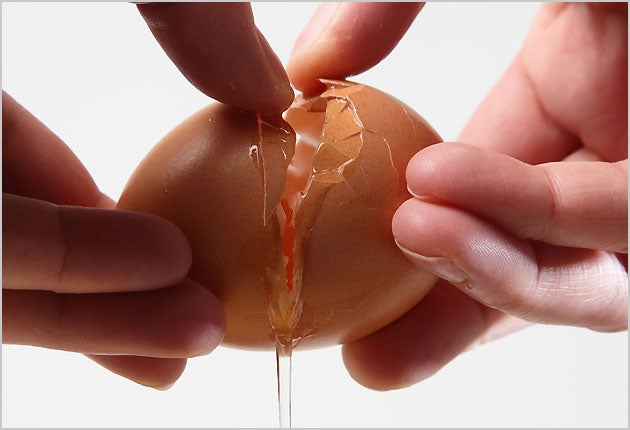Your support helps us to tell the story
From reproductive rights to climate change to Big Tech, The Independent is on the ground when the story is developing. Whether it's investigating the financials of Elon Musk's pro-Trump PAC or producing our latest documentary, 'The A Word', which shines a light on the American women fighting for reproductive rights, we know how important it is to parse out the facts from the messaging.
At such a critical moment in US history, we need reporters on the ground. Your donation allows us to keep sending journalists to speak to both sides of the story.
The Independent is trusted by Americans across the entire political spectrum. And unlike many other quality news outlets, we choose not to lock Americans out of our reporting and analysis with paywalls. We believe quality journalism should be available to everyone, paid for by those who can afford it.
Your support makes all the difference.Cakes and quiches sold in high street supermarkets are the UK foods containing liquid eggs contaminated with dioxins, it was reported today.
Two British manufacturers used the egg to make products for UK retailers, the Food Standards Agency (FSA) told BBC Radio 4's You And Yours.
The products had a short shelf life and may well have been eaten by now, or would be getting close to their sell-by dates, the programme said.
However, the FSA emphasised that the mixing of the eggs would have diluted the levels of dioxins and there is not thought to be a risk to health.
Fourteen tons of the contaminated liquid egg which originated on continental Europe has entered the UK destined for use in goods like pastries and mayonnaise, the EU executive said yesterday.
The alert came after it was discovered that poultry feed contaminated by toxic dioxins was sent to more than 1,000 poultry and pig farms in Germany.
Some of the eggs from those farms were then transported to Holland.
The FSA said: "These eggs were mixed with other non-contaminated eggs to make pasteurised liquid egg. This pasteurised liquid egg has been distributed to the UK.
"The mixing of the eggs will have diluted the levels of dioxins and they are not thought to be a risk to health.
"The FSA is currently liaising with the industry and will provide further updates as information becomes available."
European Commission health spokesman Frederic Vincent described how the problem had now reached Britain.
"Those eggs were... processed and then exported to the United Kingdom... as a 14-tonne consignment of pasteurised product for consumption," he told reporters.
"Whether it went into mayonnaise, pastries, I don't know. So we will probably take a look at this with the UK authorities and see what was done with these eggs."
The problem appears to have originated when oils intended for bio-fuel became mixed with oil destined for animal feed.
The dioxin was discovered in late December but the extent of the problem was only revealed this week when German officials said 3,000 tonnes of feed were affected.
Germany has stopped more than 4,700 farms selling their meat and eggs as a result of the scare.
Dioxins are chemicals formed by industrial processes and waste burning.
They have been shown to contribute to higher cancer rates and affect pregnant women.
Ian Jones, from the British Egg Products Association, said the versatility of liquid egg made it useful to food manufacturers.
Describing the market as "extremely big", he said around 24% of eggs eaten in the UK are consumed in product form, with around 30% of products imported.
He told You And Yours that association members were "extremely concerned" about the impact of the contamination on the industry and urged people to check for the British Lion mark on eggs.
"I have to say this is not the first instance that there has been of contaminants coming into egg products into the UK," Mr Jones said.
"In the UK we have addressed this very stringently.
"We have a very detailed code of practice for the production of Lion egg products and that starts right at the beginning with the production of the egg, and particularly the feed that is fed to the bird before it starts laying, so we have a very clear code of practice."
Asked how cautious consumers should be, he said: "We need to keep it in context.
"The FSA have made it very clear that the level of any potential contamination is very low but the fact remains the contaminant shouldn't have been in the product in the first place and there are ways of making sure that safe food is produced."
The FSA later said the egg had been supplied to Kensey Foods in Cornwall, a division of Samworth Brothers, and Memory Lane Cakes Ltd in Cardiff, a division of Finsbury Food Group.
The two manufacturers used the pasteurised liquid egg to produce a range of short shelf life cakes and quiches, which were supplied to the major UK supermarkets.
The FSA said it did not have a "definitive list" of the supermarkets who sold the products, but Tesco and Morrisons were two of them.
The FSA added: "There is no food safety risk from eating these products. The majority of products will have been sold and most have passed their 'use by' or 'best before' dates.
"Supermarkets are removing the small amount of products that are still in date."

Join our commenting forum
Join thought-provoking conversations, follow other Independent readers and see their replies
Comments